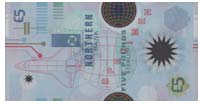
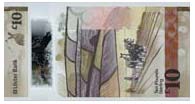
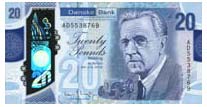

Polymer notes are made of plastic. The first polymer note to be issued in Northern Ireland was the 1999 Five Pound polymer note issued by the Northern Bank. The Northern Bank £5 polymer note was also the first plastic banknote issued in the United Kingdom, over a decade ahead of the introduction of polymer notes by any other UK bank.
The Northern Bank ceased issue of its £5 polymer note issue in 2008, leaving its £10 note as its lowest denomination note. The Northern Bank polymer £5 note remains redeemable at its face value without time limit.
Northern Bank was owned by National Australia Group in 1999, and the Northern Bank polymer £5 note reflects the currency notes in Australia which had first introduced polymer notes in 1996.
After the withdrawal of the Northern Bank plastic 5 pound note in 2008 [1.], banknote issues in Northern Ireland reverted to paper notes for the next decade.
Polymer notes were reintroduced in Northern Ireland in 2019, following a general trend by UK issuing banks of replacing paper banknotes with plastic notes.
Three banks, Bank of Ireland, Danske Bank, and Ulster Bank replaced their paper notes with polymer notes from 2019.
The fourth note-issuing bank, First Trust Bank, ceased note issue on 30 June 2022 without issuing any polymer banknotes. A test note was prepared in plastic by De La Rue simulating two alternative designs for a First Trust Bank polymer note, prior to the bank's decision to cease note issue.
Bank of Ireland, Danske Bank, and Ulster Bank all began to introduce polymer notes in Northern Ireland in 2019. Each bank issued several denominations on a phased basis which replaced their paper counterparts in circulation.
Initially, £5 and £10 denominations were introduced together in February 2019 [2.]. Danske Bank did not issue £5 notes, and issued just a £10 polymer note.
All three banks issued polymer £20 notes in mid-2020, and an Ulster Bank polymer 50 note was issued in June 2022.
Paper £5 and £10 notes ceased to circulate in northern Ireland on Monday 30 September 2019. from this date onwards retailers could refuse to accept these denominations. They remained redeemable at face value by their banks of issue [3.].
Paper £20 notes ceased to be accepted in Northern Ireland from 1 October 2022 [4.].
A deadline of 29th September 2023 was decided upon for the withdrawal of paper £50 and £100 Northern Ireland notes. After this date no paper notes were valid as a means of payment in Northern Ireland, and the notes could only be exchanged at a branch of their bank of issue.
All Northern Ireland banknotes made of paper remain exchangeable at their face value without time limit.
The design of the polymer banknotes of each of the three banks is structurally similar in that each note incorporates a transparent window area, in common with Scottish polymer notes and Bank of England polymer notes.
The Bank of Ireland polymer notes are of a uniform design across the denominations, with the predominant colours of the 5 pound notes being blue; 10 pound notes, burgundy; and 20 notes, green. The overall design of the Bank of Ireland notes is very similar to its last design of paper notes, the 2013 Bushmills Series. Bank of Ireland polymer notes are printed by De La Rue.
The Bank of Ireland polymer notes are the third design of notes featuring Bushmills Distillery on the reverse of each denomination, and a portrait if Hibernia on the face.
Replacement notes, identified with ZZ prefix, have only been recorded for the first date of £5 and £10 Bank of Ireland polymer notes. No replacement notes have been recorded fot the £20 note.
The new Danske Bank Polymer Notes are of a similar design to the bank's last paper banknote designs and are printed by De La Rue. The 10 pound notes are green, and the 20 pound notes are blue.
Replacement ntoes have only been recorded for the first date of the £10 Danske Bank polymer note. It appears that marked replacement notes were not used for the £20 note or later dates of the £10 note.
The Ulster Bank polymer banknotes are a radical departure from Ulster Bank's paper notes. The banknotes employ a portrait design format, reminiscent of the Northern Bank polymer 5 pound note issued in 2000.
Glasgow Designers O Street [5.] worked with De La Rue and service designers Nile to create the vertical format design of the new Ulster Bank polymer notes.
This group of designers was also involved with the design of the Royal Bank of Scotland polymer notes.
Royal Bank of Scotland and Ulster Bank are both owned by National Westminster Bank Plc. There are some common structural similarities between to both the Ulster Bank and the Royal Bank of Scotland notes. Another similarity between the Scottish and Northern Irish banknotes is the creative use of UV activity in the design of both series. The UV fluorescence in the Ulster Bank notes are a work of art in themselves.
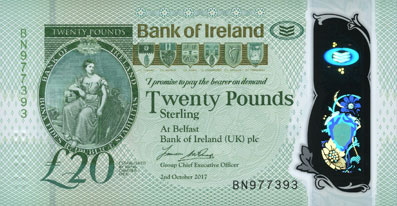
![]()
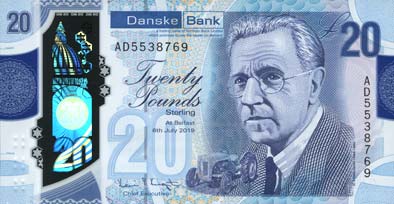
![]()
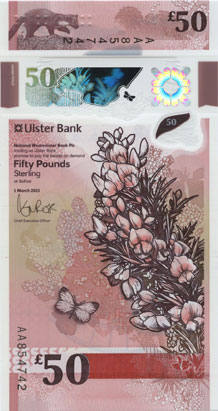
![]()
By 2024 all denominations of the Northern Ireland polymer notes were in circulation, with all paper banknote issues having been withdrawn.
Several dates have been recorded for banknotes issued by some of the banks, and Bank of Ireland and Danske Bank replacement notes with ZZ prefix have also been recorded for each denomination. No replacement notes have been seen for Ulster Bank polymer notes.
There are two types for the Ulster Bank polymer notes, those printed with 'Ulster Bank Ltd.' as issuer, and those printed with 'National Westminster Bank Plc trading as Ulster Bank' as issuer.
Following is a listing from observation of notes in circulation of all recorded dates and prefixes of the Northern Ireland polymer notes.
5 Pounds
8 Oct 1999. Prefix MM. N Replacement prefix. Signature: D. Price, Chief Executive.
1 Jan 2000. Prefix Y2K.
5 Pounds
Dimensions: 125 x 65 mm.
31 May 2017. Prefix AA-AN continuing. ZZ Replacement prefix. Signature: Thomas McAreavey, Chief Financial Officer
10 Pounds
Dimensions: 133 x 70 mm.
31 May 2017. Prefix AA-AR continuing. ZZ Replacement prefix. Signature: Thomas McAreavey.
20 Pounds
Dimensions: 139 x 73 mm.
02 Oct 2017. Prefix AA-BY continuing. No Replacement notes. Signature: Thomas McAreavey.
10 Pounds
Dimensions: 133 x 70 mm.
6 July 2017. Prefix AA. ZZ Replacement prefix.
25 July 2022. Prefix AB continuing. Signature: Victoria Davies.
20 Pounds
Dimensions: 139 x 73 mm.
6 July 2019. Prefix AA-AD. No Replacement notes. Signature: Kevin P. Kingston.
25 July 2022. Prefix AE continuing. Signature: Victoria Davies.
Letters I and O are skipped in prefixes.
5 Pounds
Dimensions: 65 x 125 mm.
12 Apr 2018. Prefix AA-AR continuing. Signature: Ross McEwan.
10 Pounds
Dimensions: 133 x 70 mm.
12 Apr 2018. Prefix AA-AU continuing. Signature: Ross McEwan.
20 Pounds
Dimensions: 73 x 139 mm.
As 'Ulster Bank Ltd'.
22 Feb 2019. Prefix AA-AT. Signature: Ross McEwan.
As 'National Westminster Bank Plc trading as Ulster Bank'.
- Prefix AU seen only on a specimen note.
1 March 2021. Prefix AV-BN. Signature: Ross McEwan.
2 Dec 2021. Prefix BP-CA. Signature: Alison Rose (Chief Executive Officer).
27 Nov 2023. Prefix CB-CN continuing. Signature: J.P. Thwaite.
50 Pounds
Dimensions: 77 x 146 mm
3 March 2021. Prefix AA, AB. Signature: Alison Rose (Chief Executive Officer).
Certain areas on all Northern Ireland polymer notes fluoresce under ultra violet light.
Below are illustrations of a polymer note from each bank under normal light alongside the same note exposed to a 365nm UV light source. In addition to imagery, the serial numbers on each of the banknotes fluoresce under UV light.
While UV imagery is an effective guard against forgery, it is not foolproof and forgeries incorporating UV active features of the Ulster Bank polymer £50 note were detected in 2024 [6.].
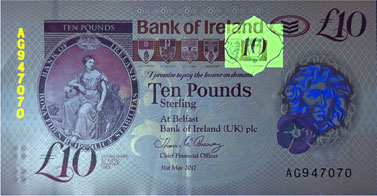
![]()
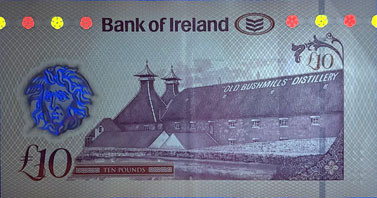
Ulster Bank polymer notes have extensive UV fluorescent imagery. The notes are an innovative and completely new design.
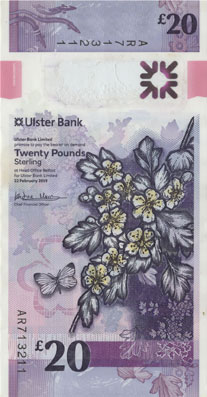
![]()
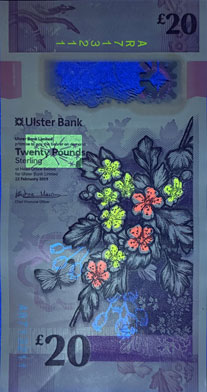
![]()
Ulster Bank 20 Pound note face and reverse, and exposed to a 356nm ultra violet light source showing the UV activity on the note
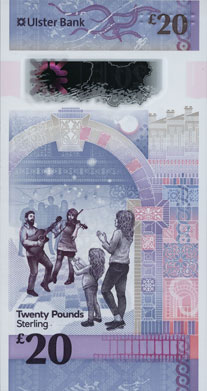
![]()
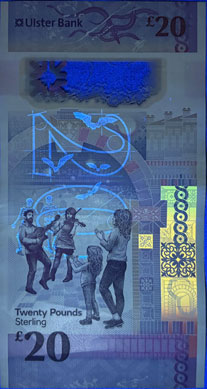
All of the denominations of each of the three banks incorporate microprinting to some degree in their designs.
References
1. A BBC article published in 2016 on the occasion of the introduction of the first polymer note by the Bank of England. https://www.bbc.co.uk/news/uk-northern-ireland-37342948
2 Committee of Commercial Banknote Issuers. https://www.ukfinance.org.uk/CCBI/banknotes
3. Belfast Telegraph Newspaper article 2019. https://www.belfasttelegraph.co.uk/business/northern-ireland-paper-5-and-10-banknotes-withdrawn-from-circulation-on-monday/38544735.html
4. https://www.bbc.co.uk/news/uk-northern-ireland-63087511
5. O Street Design, Glasgow. Designers of the Ulster Bank polymer notes. https://ostreet.co.uk/project/ulster-bank
6. British Security Industry Association information leaflet on polymer banknote forgeries. https://www.bsia.co.uk/zappfiles/bsia-front/safergems/safer%20gems%20%20ulster%20%C2%A350%20notes1.pdf.
1 Pound Ploughman
5 Pounds Ploughman
10 Pounds Ploughman
20 Pounds Ploughman
50 Pounds Ploughman
100 Pounds Ploughman
Irish Ten Shilling Notes
1 Pound Note Lady Lavery
5 Pounds Lady Lavery
10 Pounds Lady Lavery
20 Pounds Lady Lavery
50 Pounds Lady Lavery
100 Pounds Lady Lavery
1 Pound Note, Queen Medb
5 Pound Note, John Scotus Eriugena
10 Pound Note, Jonathan Swift
20 Pound Note, W. B. Yeats
50 Pound Note, Turlough O'Carolan
100 Pound Note, Grace O'Malley
5 Pound Note, Sister Catherine McAuley
10 Pound Note, James Joyce
20 Pound Note, Daniel O'Connell
50 Pound Note, Douglas Hyde
100 Pound Note, Charles Stewart Parnell
Northen Ireland Polymer notes
Bank of Ireland Polymer Notes
Danske Bank Polymer Notes
Ulster Bank Polymer Notes
Special Sections and Articles
The Transition of Irish Currency, Irish banknotes 1918–1928
The Partition of Irish Currency, Irish banknotes 1928–1930
Banknote Design Evolution 1824 to 1916
Irish Three Pound Notes
Contemporary Forgeries of Early Irish Banknotes, ca1800-1930
Limerick Soviet Notes
Irish World War 2 Banknote Issues
Low Number Irish Banknotes
Irish Joint Stock Banks of Note Issue from 1783
Irish Legal Tender Note Specimens
Ploughman Scan Survey (PSS)
![]() Page under active revision, last update 10.04.25
Page under active revision, last update 10.04.25